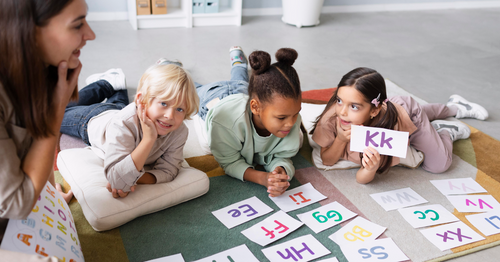Teaching young learners is a noble and rewarding profession. However, it comes with its own set of challenges, misconceptions, and myths. These myths often deter aspiring educators or lead to ineffective teaching practices.
In this article, AllRight.com will debunk some of the top myths about teaching young learners to help educators and parents better understand the realities of working with children.
8 Myths About Teaching Young Learners
Myth 1: Teaching Young Learners Is Easy
Contrary to popular belief, teaching young learners is far from easy. It requires a unique skill set that encompasses patience, adaptability, creativity, and a deep understanding of child development. Young learners are like sponges, absorbing information from their surroundings, which makes it essential for educators to be well-prepared and able to adapt their teaching methods to suit each child's needs.
Myth 2: Play Is Just Fun and Games
Play is not merely about fun and games for young learners; it is a fundamental aspect of their cognitive and social development.
Through play, children explore their environment, learn problem-solving skills, develop social relationships, and enhance their creativity.
Effective educators recognize the educational value of play and incorporate it into their teaching strategies.
Myth 3: Young Children Cannot Learn Complex Concepts
Many people believe that young children are incapable of grasping complex ideas. However, research in early childhood education demonstrates that children have a remarkable capacity for learning. While the approach to teaching may need to be age-appropriate and scaffolded, young learners can absorb and understand sophisticated concepts if presented in an engaging and accessible manner.
Myth 4: Teaching Young Learners Requires No Special Training
Some may think that anyone can teach young children without specific training. However, effective teaching in early childhood requires specialized knowledge of child development, age-appropriate teaching methods, and strategies for addressing diverse learning needs. Proper training and continuous professional development are essential for success in this field.
Myth 5: Testing Is Beneficial for Young Learners
The pressure to assess young learners through formal testing has grown in recent years. However, this can be counterproductive. Excessive testing can create stress and hinder a child's natural curiosity and love of learning. Instead, assessment should focus on observation and qualitative methods to gain a holistic understanding of a child's progress and needs.
Myth 6: Technology Is a Replacement for Traditional Learning
While technology can be a valuable tool in education, it should not replace traditional methods, especially for young learners. Hands-on experiences, face-to-face interactions, and physical play are crucial for their development. AllRight is aware that technology should complement, not replace, these essential elements of early childhood education.
Myth 7: All Children Develop at the Same Rate
Children develop at their own pace, influenced by various factors such as genetics, environment, and individual experiences. It is a mistake to expect all children to reach developmental milestones at the same time. Effective educators recognize these individual differences and provide tailored support to help each child progress at their own speed.
Myth 8: Discipline Equals Punishment
Discipline in early childhood education is not about punishment, but about teaching children appropriate behavior and social skills. Positive discipline techniques, such as redirection, setting clear expectations, and using positive reinforcement, are more effective in fostering a child's self-control and emotional regulation.
8 top tips
1. Instructions
Make sure you deliver them in a clear, succinct, and step-by-step manner. Giving and receiving examples will allow you to make sure. Offer in numerous ways; for instance, use gestures to amplify and visual cues like an ear for listening. Provide the instructions in the right order and avoid using sequencers like "before you do this."
2. Use positive classroom atmosphere
Say what you want learners to do, not what you don’t want them to do.
For example, say ‘Look at the board’ rather than ‘Don’t keep turning around’.
3. To reinforce procedures and norms, use images.
Use a traffic light system, for instance, to indicate when everyone in the group is veering off course. To help students understand the progression of the lesson's activities, use visual cues.
4. Have a seating plan in mind, and consider your students' needs.
For instance, students with hearing impairments should sit close to the teacher, and students with ADHD should sit away from distractions like windows and radiators.
5. Learn from your students.
What helps? - Ask them. Learn about their areas of strength and passion.
6. Apply a multisensory strategy.
Have them sing or draw the word stress, for instance, or have them step out the word stress. Use several methods to get feedback, such as using individual tiny whiteboards where students can display their responses.
7. Establish a supportive environment where students assist one another.
For instance, implement a buddy system where students occasionally assist individuals with SENs. Employ exercises that foster empathy, such as making educated guesses about other people present.
8. Collaboration with parents and other professionals
Consider what functions rather than the issues. Do more of what is effective.
Conclusion
Teaching young learners is a profession filled with challenges and misconceptions. However, as we've explored in this article, AllRight.com is here to debunk these myths and shed light on the realities of working with children. With its comprehensive approach to education, AllRight can assist teachers in creating the best learning atmosphere by emphasizing the importance of patience, adaptability, creativity, and a deep understanding of child development, integrating play as a vital educational tool, recognizing the capacity of young children to grasp complex concepts, advocating for specialized training in early childhood education, promoting a balanced approach to assessment, understanding the role of technology in education, acknowledging individual differences in development, and emphasizing positive discipline techniques.
By following these tips and working together with parents and other professionals, educators can ensure that young learners receive the best possible education, setting them on a path to lifelong learning and success. AllRight.com stands as a valuable resource in this endeavor, offering support and guidance to educators and parents alike.









